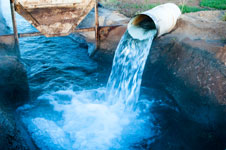SVQ Designing Water Networks SCQF level 6 (GR6Y 23)

The Scottish Vocational Qualification (SVQ) in Designing Water Networks at SCQF level 6 allows candidates to demonstrate their skills and competence in this particular area of work and expertise.
This qualification has six mandatory units including: Assessing Factors that Impact on Utility Network Designs and Producing Detailed Drawings to Support Utility Network Activities.
This SVQ is based on the National Occupational Standards (NOS) set and published by the sector skills council, Energy and Utility Skills. SQA works in partnership with other organisations to ensure that NOS are relevant to the current and future needs of Scottish industries.
This qualification is available through employers and training providers.
Use the tabs below to open each section individually. Alternatively you can show all the sections.
Why deliver this qualification
Upon successful completion, learners will gain an internationally recognised qualification which guarantees that they have the skills, knowledge and abilities required to carry out their role successfully. Employers will also benefit from their employees being proficient.
As assessment is carried out in the workplace, this minimises any time learners would need to be away from their work.
The SVQ can be offered in any of the following modes:
- full-time
- part-time (eg day-release)
Who does this qualification suit
This SVQ is intended for employees in the water sector.
Access
Entry is at the discretion of the centre.
The majority of candidates' evidence for this SVQ must be generated from real work activities. This means that any learner undertaking the SVQ in Designing Water Networks at SCQF level 6 must be working in water network design on a regular basis.
Progression
The SVQ in Designing Water Networks at SCQF level 6 could provide learners with the opportunity to progress to other water-related SVQs at SCQF level 6. Successful completion of the qualification could also open up more employment opportunities and career prospects in the sector.
Approval
Centres with devolved authority for approval should use their own internal approval process.
Centres without devolved authority are required to come forward for approval and should contact SQA's Business Development Team for guidance.
Assessors and verifiers must be able to meet SQA's general requirements for technical/occupational competence as outlined in the Systems and Qualification Approval Guide.
How to assess
For general information on how to assess this qualification, please refer to the document Information for Assessment of Scottish Vocational Qualifications (SVQs). For detailed guidance on how to assess this particular SVQ, please refer to the assessment strategy.
Where can you take this course?
Qualification content and delivery tools
Information about the qualification(s)
Qualification Structure
The SVQ in Designing Water Networks at SCQF level 6 consists of six mandatory units.
Group Award: GR6Y 23
For details of the units making up the SVQ, please refer to the qualification structure (61 KB).
National Occupational Standards
Unit information for this qualification is available on our Unit Search.
Core Skills signposting
Core Skills mapping is carried out by the SSC responsible for the development of an SVQ. It is a requirement of SQA Accreditation that every SVQ submission includes information on where possible opportunities for candidates to develop Core Skills exist across the mandatory units.
Centres should note that mapping is not audited or validated against the Core Skills framework/units so is not accepted by SQA awarding body as evidence towards achievement of the Core Skills units.
- Core Skills signposting (72 KB)
Modern Apprenticeships
This SVQ is included in the Water Industries Modern Apprenticeship.
SQA also offer the following Core Skills components and other mandatory and optional qualifications included in the Apprenticeship framework:
| Unit title | SCQF 5 |
|---|---|
| Core Skills: Communication | F427 04 |
| Core Skills: Numeracy | F42B 04 |
| Core Skills: Information and Communication Technology | F42F 04 |
| Core Skills: Problem Solving | F42K 04 |
| Core Skills: Working with Others | F42P 04 |
Information about delivery, assessment, quality assurance and support material
Assessment strategy
- Assessment strategy (301 KB)
Assessor's guidelines
- Assessor's guidelines (670 KB)